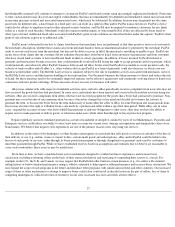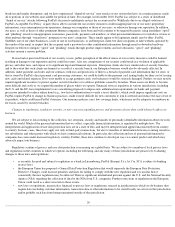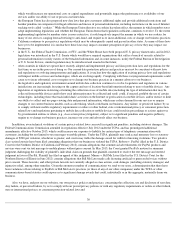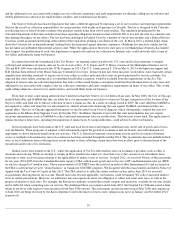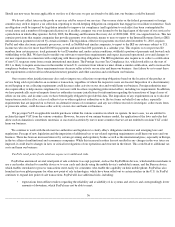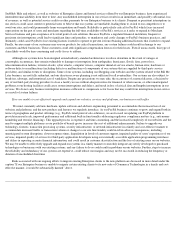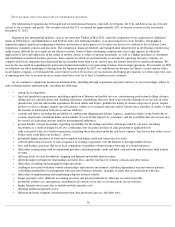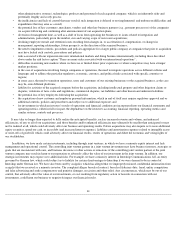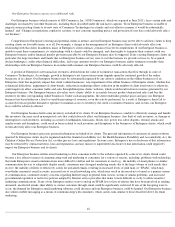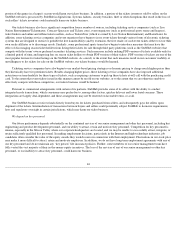eBay 2013 Annual Report Download - page 36
Download and view the complete annual report
Please find page 36 of the 2013 eBay annual report below. You can navigate through the pages in the report by either clicking on the pages listed below, or by using the keyword search tool below to find specific information within the annual report.
provided in an ecommerce transaction. For example, in the Louis Vuitton Malletier litigation, we were found liable in France, under French law,
for transactions on some of our websites worldwide that did not involve French buyers or sellers (see “Item 3: Legal Proceedings” below). Laws
regulating Internet and ecommerce companies outside of the U.S. are generally less favorable than those in the U.S., giving greater rights to
consumers, content owners, competitors, users and other third parties. Compliance may be more costly or may require us to change our business
practices or restrict our service offerings, and the imposition of any regulations on us or our users may harm our business. In addition, we may be
subject to multiple overlapping legal or regulatory regimes that impose conflicting requirements on us (e.g., in cross-border trade). Our alleged
failure to comply with foreign laws could subject us to penalties ranging from criminal prosecution to significant fines to bans on our services, in
addition to the significant costs we may incur in defending against such actions.
Following the global financial crisis, U.S. federal lawmakers enacted the Dodd-Frank Act overhauling the federal government's oversight
of consumer financial products and systemic risk in the U.S. financial system. Although the full effect of the new legislation will be dependent
on regulations to be adopted by a number of different agencies (including the Consumer Financial Protection Bureau), we expect the general
effect of the financial reform law will be to require PayPal and Bill Me Later to make additional disclosures to their users and to impose new
restrictions on certain of their activities. For example, in January 2012, the Consumer Financial Protection Bureau finalized new regulations,
required by the Dodd-Frank Act that required PayPal, starting in late October 2013, to provide additional disclosures, error resolution rights and
cancellation rights to U.S. consumers who make international remittance payments, which could increase our costs of processing international
payments. The Consumer Financial Protection Bureau has also launched a complaints portal on its website that allows customers to file
complaints against PayPal and other money transfer service providers, and publishes information on such complaints. These and other new
obligations will impose new compliance requirements and obligations on us that could increase our costs, may result in increased litigation and
the need to make expensive product changes and may otherwise adversely impact our business.
In addition, we also expect that the continued implementation of the Dodd-Frank Act will adversely impact some significant traditional
revenue streams for banks. For example, in June 2011, the Federal Reserve Board issued a final rule capping debit card interchange fees. As a
result of this and other regulations implementing the financial reform law, banks may need to revise their business models to remain profitable,
which may lead them to charge more for services which were previously provided for free or at lower cost. Any resulting increases in service
fees required for PayPal to process transactions (e.g., service fees for automated clearing house transactions) would increase our costs and could
adversely affect our business.
Our business and users may be subject to sales tax and other taxes.
The application of indirect taxes (such as sales and use tax, value-added tax (VAT), goods and services tax, business tax and gross receipt
tax) to ecommerce businesses such as eBay and to our users is a complex and evolving issue. Many of the fundamental statutes and regulations
that impose these taxes were established before the adoption and growth of the Internet and ecommerce. In many cases, it is not clear how
existing statutes apply to the Internet or ecommerce. In addition, governments are increasingly looking for ways to increase revenues, which has
resulted in discussions about tax reform and other legislative action to increase tax revenues, including through indirect taxes.
Some jurisdictions have implemented or may implement laws specifically addressing the Internet or some aspect of ecommerce. For
example, the State of New York has passed legislation that requires any out-of-
state seller of tangible personal property to collect and remit New
York use tax if the seller engages affiliates above certain financial thresholds in New York to perform certain business promotion activities. In
March 2013, the New York Court of Appeals (New York State's highest court) upheld this legislation in Amazon.com, LLC and Overstock.com,
Inc. v. New York State Department of Taxation and Finance. In August 2013, Amazon.com, LLC and Overstock.com, Inc. filed writs of
certiorari with the U.S. Supreme Court. In December 2013, the Supreme Court denied these writs, so the New York law remains in effect. In
September 2012, California enacted a new law which is similar to the law passed in New York, but provides exclusions for certain forms of
Internet marketing and is limited to retailers who exceed prescribed sales volume thresholds. However, if our sellers who are not already
required to collect California sales or use tax believe that their use of our websites requires them to collect California use tax, they may elect to
limit their use of our websites rather than collect the tax, which would harm our business. Several other states have also enacted similar laws
related to affiliates, and a number of other states are considering similar legislation. In addition, the Pennsylvania Department of Revenue has
ruled that an out-of-state retailer using Pennsylvania-
based affiliates could have nexus in Pennsylvania under existing statutes. Most of these new
laws and positions are being challenged and in May 2012, a Cook County Circuit Court judge ruled that the Illinois Internet Affiliate Nexus Law
was unconstitutional. The State of Illinois filed a direct appeal to the Illinois Supreme Court. In October 2013, the Illinois Supreme Court upheld
the trial court decision. The adoption of such legislation by states where eBay has significant operations that perform certain business promotion
activities could result in a use tax collection responsibility for certain of our sellers. This collection responsibility
34





